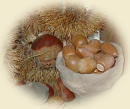"Nabatake"
Where did rice come from?
ü\Karatsu-the gateway to and from the Asian
Continentü\
Hi, friends.
Spring has come.
River banks and roadsides are all yellow
with the rape flowers.
Today, I would like to invite
you to a very
special place in Karatsu.
It is "Nabatake" Archaeological
Relics.
Would you like to know what "Nabatake"
means? It is "Rape-flower fields".
We take oil from rape seeds. We use the oil
for cooking, and before electricity we used
it to light our nights.
Here, in the near centuries, as far as you
could see, there were rape fields. That is
why this place is called Nabatake even now.
Some twenty years ago, an archaeological
discovery surprised and delighted Japan.
The relics showed that here was a small village
about 2600years ago. Later it was designated
as the National Historical Relics as the
oldest rice fields (water field) in Japan.
We could see where rice came from, and it
is a hint to solve the question, "Where
did we come from?"
Now the site was covered again
and on that
place we have a museum "Matsuro-kan"
to commemorate this origin of
Japanese agricultural
civilization.
Be an archaeologist today, and enjoy your
small tour in the museum!
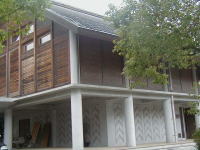 |
Matsuro-kan Museum, in Nabatake, Karatsu. |
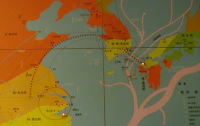 |
From where did rice come to Japan?
One route is from China.
Another is from Korea.
There may be some other routes.
|
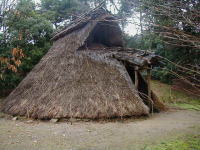 |
In the yard of the museum, you can see a
house of ancient time.
To build this hut, first dig a round hole
on the ground about 2 feet deep. Second,
stand some pillars to support the roof. Shape
the roof like woman's skirt. Use bamboos
and timbers as the petticoat.
And thatch the roof with weeds or some other
things. |
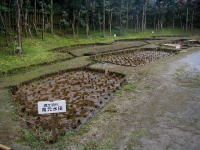 |
Retrieved ancient rice field.
Small stream is near, and water is led into
the fields. |
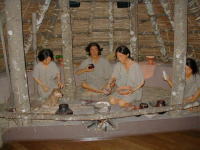 |
Inside the house, and the family of the ancients.
Mom is cooking. Papa is drinking. Girl is
pounding nuts with a stone to help mother.
Young boy is playing with a dog.
Around the fire, what a happy family!
Hello, my far ancestors! |
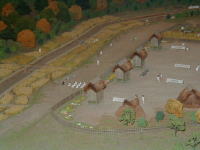 |
Ancient village in this land must have been
like this miniature.
In the forest, they gather nuts, hunt small
animals and shoot birds. They get timbers
and fuel also.
There is a river, which
grows rice abundantly.
The village faces a bay,
where they fish
and get shell-fish.
Houses are surrounded with
walls against
enemies.
In the photo, small white dots are people.
Long white boards are sign boards to explain
us what these people are doing. |
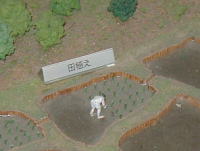 |
This man is planting rice shoots into the
water field.
We do not seed directly in the water fields.
We seed in other small patch of water, and
when the young shoots are about 1 foot tall,
we replant them into the water field, where
water is about our ankle deep. |
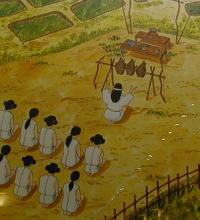 |
The priest is saying a prayer. It is a harvest
festival like your thanksgiving day. Pig
heads are the offerings to the Gods. |
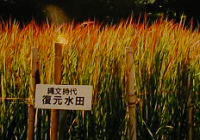 |
You will be surprised to see how red the
ancient rice is. |
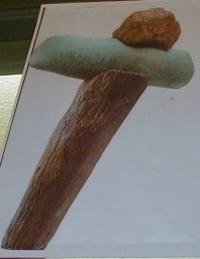 |
Tools were made with stones and trees. |
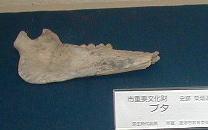 |
They had already started to have domestic
animals to preserve food. This jaw-bone of
pig shows this pig suffered from toothache,
which, wild boars would never have had. Poor
pig!
This bone is an Important Cultural Treasure
of Karatsu City. Please don't steal it, Mr.
Thieve. |
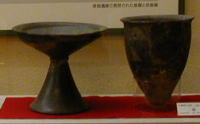 |
They made beautiful earthenware too. |
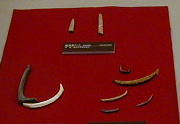 |
Fish bones were used to fish fishes. |
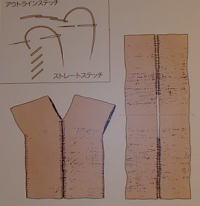 |
Sea urchin prickles were used as needles,
and clothes were made like this.
Hum... nice fashion! |
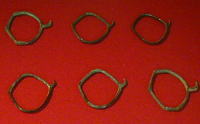 |
Shells from south sea were bracelets. This
shell can not be found in near water. That
tells us they were already trading. |
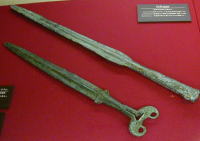 |
Weapons tell us that the time was not peaceful.
There were wars. |
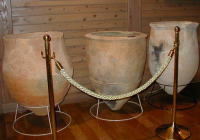 |
Coffins.
Two urns were laid mouth to mouth, and inside
the dead person was laid.
Sometimes, only one urn was used for plain
people.
What did they dream in this coffin?
I feel it was an eternal peace that they
wanted.
They will feel sorry to
wake up and know
there still remain wars
between nations.
We never learn! |
Thank you very much for meeting my far parents.
I hope you understand that
Karatsu is a very
special place in Japan.
It is the gateway
to and from the Asian Continent
and the South
Sea.
If you see yellow rape flowers, remember
Nabatake, from where the dawn of Japanese
civilization broke.
 |
Thank you very much for visiting this page.
I hope you will return next month.
Yours, Harumi Okochi
Proprietress of Ryokan Yoyokaku
|
 Mail to Harumi Okochi Mail to Harumi Okochi |
|
|
|

